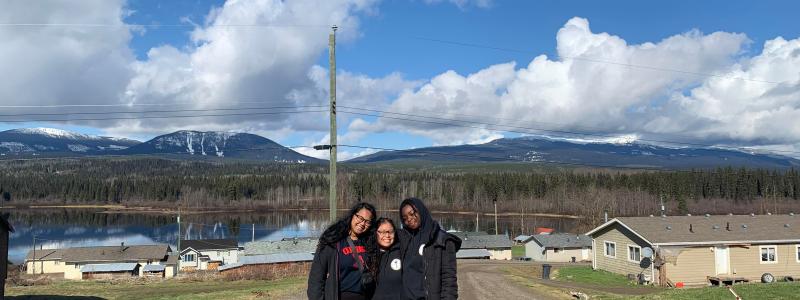During a two-week trip to Fort Babine in May, a team of TWU students spent time with the local Indigenous community, taking time to listen, learn, and get to know one another.
Fort Babine is a small native reserve community located at the north shore of Babine Lake in central B.C. The area is located approximately 100 km north of the town of Smithers and accessible by a gravel logging road. The traditional name of the community is “Wit’at” or “Wit’ane Keh,” which means “place of making dry fish.”
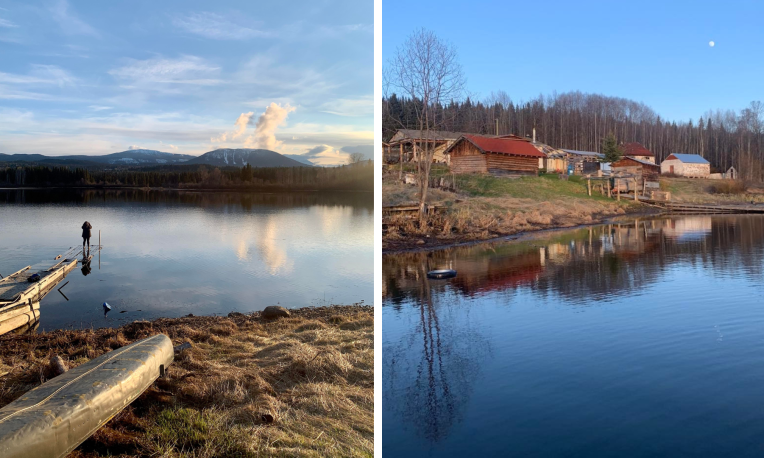
Short-term service, long-term transformation
Led by TWU’s Global Outreach (part of the Student Life department), this year’s trip was the first service-learning trip since the pandemic began. The mission of Global Outreach, inspired by Micah 6:8, is to “develop spiritually maturing disciples of Jesus who do justice, love mercy, and walk humbly with God.”
Keeping with the same spirit as previous TWU trips, the purpose of this year’s trip was to build relationships...and spend time simply living life with the local community.
Service-learning trips are among the many student leadership opportunities offered by Global Outreach. These short-term service engagements aim to produce “long-term student and host-community transformation.”
This year’s team follows in the footsteps of numerous TWU groups who have been visiting Fort Babine for many summers over the past 30 years.
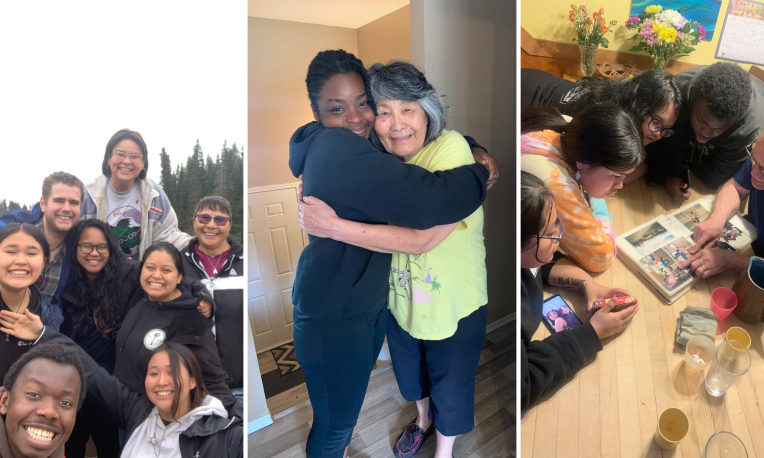
TWU alumni serving in First Nations communities
In 1992, students Mike and Geralyn Cunningham were part of TWU’s very first trip to Fort Babine. The following year, Mike and Geralyn joined the Fort Babine trip for a second time, but this time as team leaders.
Following their graduation, Mike and Geralyn returned to Fort Babine yet again, only now to live and serve in the community long-term as missionaries. Ever since that time, the couple has been serving First Nations communities in central B.C. through a ministry that they helped to establish and run, called Streetcorners Ministry.
Among the beautiful things that the team members observed [at Fort Babine]...was the way in which elders were bringing up the younger generation.
Mike and Geralyn are not the only TWU alumni who have been ministering in the area.
Alumni Marissa Chambers and Leah Goertz both went on service-learning trips while they were students at TWU (Marissa went to Fort Babine and Leah went to Taiwan). Following their graduation, both began to serve First Nations communities in the Fort Babine area.
Through many years of ongoing relationship-building, the Fort Babine community has come to know and trust the student teams from TWU. This May, as TWU’s team of seven went to Fort Babine, they were joined by alumni Mike, Geralyn, Marissa and Leah.
Members of this year's team included students: Anthony Labrecque, Cedrick Iyumva, Neftali Tuyub, and Sefa Tese, along with staff members from Student Life and Global Outreach: Amanda Seymour, Cindy Easterina, and Trina Pinzon.
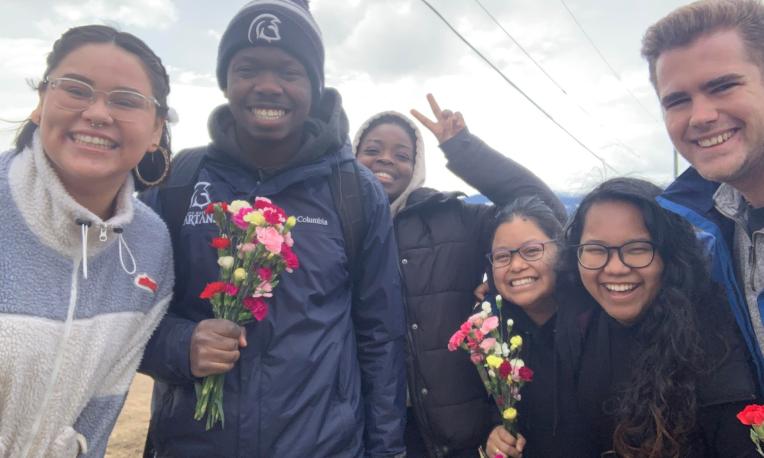
Recognizing where God is at work
Keeping with the same spirit as previous TWU trips, the purpose of this year’s trip was to build relationships, listen to people’s stories and experiences, seek to hear and understand, and spend time simply living life with the local community.
“Going into a community, we have these goals: learning, fellowship, and encouragement with the local community.”
The team spent several months in training and preparation prior to going to Fort Babine. As part of their training, students completed a curriculum under the guidance of Global Outreach staff based on the book, When Helping Hurts.
 The curriculum values the honoring of one another’s dignity and challenges the prevalent views on poverty and development work. During the Fort Babine trip, the team met daily to debrief, using questions that they learned through their training, questions such as: how is God already at work here among the local community? What is something good in the community? What is the beauty of the community?
The curriculum values the honoring of one another’s dignity and challenges the prevalent views on poverty and development work. During the Fort Babine trip, the team met daily to debrief, using questions that they learned through their training, questions such as: how is God already at work here among the local community? What is something good in the community? What is the beauty of the community?
Through these reflections, the students were encouraged to recognize where and how God is at work. Among the beautiful things that the team members observed, for example, was the way in which elders were bringing up the younger generation.
“Going into a community, we have these goals: learning, fellowship, and encouragement with the local community; this is our posture,” said Trina Pinzon, Assistant Director of Local and Global Outreach.
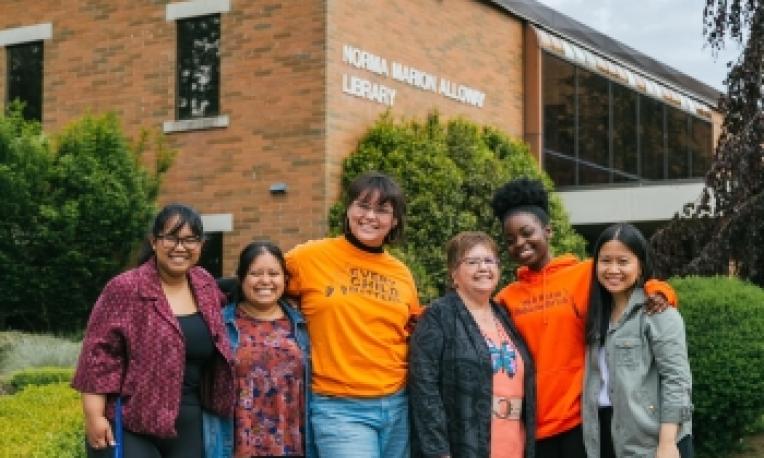
‘Seeking to listen and understand’
TWU student Cedrick Iyumva was a member of this year’s team, and he describes the team’s time in Fort Babine as primarily about “listening and learning.”
The trip was more than “just going on a trip,” Cedrick added. “It is really seeking to listen and understand. Understand how people work [and live], their suffering and their pain, and also their strength and resilience.”
On this point, he emphasized, “Strength was also a big thing we saw on our trip.”
He names several examples of people he met who greatly inspired him, many of whom were youth.
“[It's more than] just going on a trip. It is really seeking to listen and understand. Understand how people work [and live], their suffering and their pain, and also their strength and resilience.”
He remembers one nine-year-old boy who possessed incredible emotional maturity because of what he has experienced. “I learned so much from the kids,” Cedrick said. “The stories from the kids show how strong they are.”
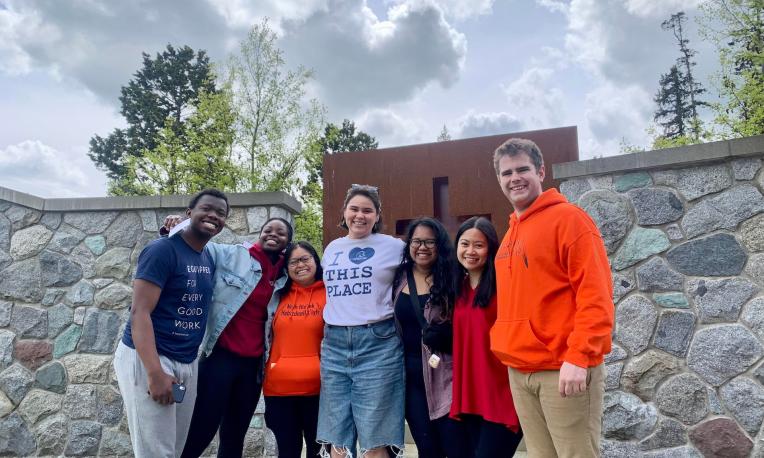
Meeting a woman of prayer
Cedrick’s host, Violet, is an elder in Fort Babine. She made a special impression on the team as a woman of prayer. “Violet always talked to us about praying,” Cedrick recalls. “Every morning when she wakes up, she goes to pray. She listens to devotions. Before bed she prays. Anthony [my teammate] said that it was so powerful and inspirational to see how much prayer is at the heart of everything she does.”
“We were blessed by them, and I felt that they were encouraged to [receive] us.”
Violet’s prayerfulness was especially striking given the experiences of the Fort Babine community throughout its history. As reported by SkeenaWild Conservation Trust researchers and the Lake Babine Nation, the legacy of metal mining around Babine Lake has led to the contamination of local waters and ecosystems. These are the same waters and natural resources that the people of Fort Babine rely on for their day-to-day living.
Cedrick witnessed how many people in the community continue to suffer from the effects. Reflecting on the impact, he said, “Colonization dispossessed them and brought disease. It’s so sad. You hear the stories of the kids and all that they’ve gone through, and all you can think of is, how are these people so strong? So resilient?”
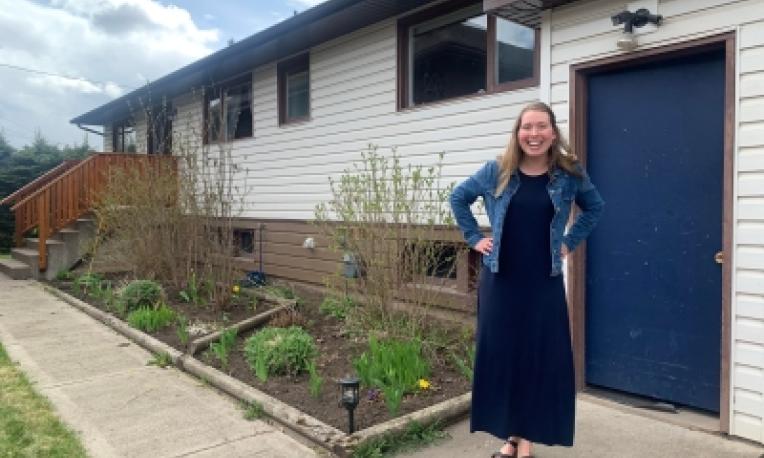
Learning the importance of hearing and understanding
In the future, Cedrick aspires to go to medical school. He knows that his experiences at Fort Babine will inform him as a health care professional. “In health care, it’s no secret that there is discrimination against minorities such as Indigenous peoples,” he said. In 2020, for example, a report presented to the provincial government reviewed racism, stereotyping and discrimination against Indigenous peoples in the B.C. health care system.
“Going there, we’re lucky that people opened the door to us, that they let us stay in their house. They let us be with them. I felt really blessed to be there. I was lucky that I was even there.”
One day, when Cedrick enters the medical field as a practitioner, he will bring with him the lessons he learned at Fort Babine. “I know the importance of hearing and understanding. I know the importance of seeking to really listen to someone,” he said.

He has become more reflective of the need for health care providers to learn to respect and care for people through spending time with them. “It goes back to empathy,” he said. “In health care, [we talk about how] it’s important to develop culturally safe care.”
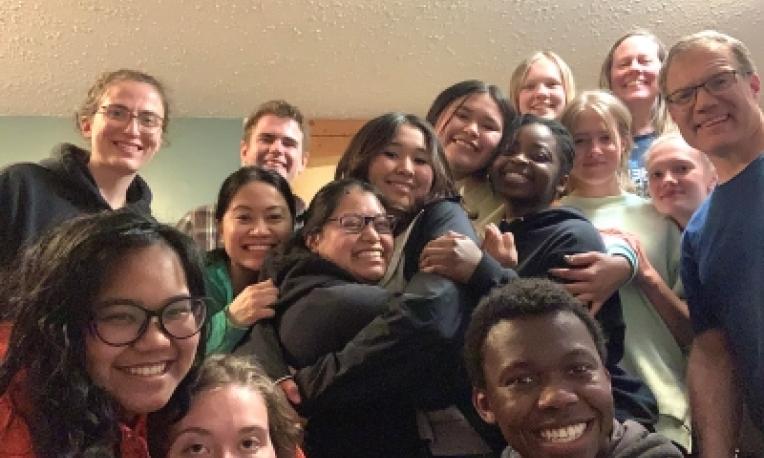
‘Lucky that I was even there’
Some of Cedrick’s best memories include singing and praising, playing guitar, and dancing with those in the community. Those simple moments changed him.
“We were blessed by them, and I felt that they were encouraged to [receive] us. That was really great,” he said as he reflected on the trip.
Cedrick continues to maintain connections with people that he met at Fort Babine. A few of his Fort Babine friends called him after he returned to TWU.
Following his time at Fort Babine, Cedrick feels immense gratitude. “Going there, we’re lucky that people opened the door to us, that they let us stay in their house. They let us be with them. I felt really blessed to be there. I was lucky that I was even there.”
Indeed, Cedrick feels that “the world needs to go to Fort Babine.” As he reflects on all that he learned from his visit to Fort Babine and the people he’s come to know, he remarks, “You would think that this isn’t Canada, but this is Canada. This is how some populations have been historically treated in Canada. That’s just the reality. …We’ve seen it with our own eyes.”
In the end, though the TWU group went to Fort Babine hoping to give, they found so much more to learn. As Mike said to the team during a debrief session, “We learn more than we teach in trips like these. …The end of the trip is a beginning rather than the end.”
About Trinity Western University
Founded in 1962, Trinity Western University is Canada’s premier global Christian liberal arts university. We are dedicated to equipping students to discover meaningful connections between career, life, and the needs of the world. Drawing upon the riches of the Christian tradition, seeking to unite faith and reason through teaching and scholarship, Trinity Western University is a degree-granting research institution offering liberal arts and sciences as well as professional schools
in business, nursing, education, human kinetics, graduate studies, and arts, media, and culture. It has four campuses and locations: Langley, Richmond-Lansdowne, Richmond-Minoru, and Ottawa. Learn more at www.twu.ca or follow us on Twitter @TrinityWestern, on Facebook and LinkedIn.
For media inquiries, please contact: media@twu.ca.
The views expressed by students and alumni are their own. They do not necessarily represent the views of Trinity Western University or of any other companies, groups or organizations named.

